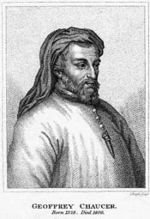
Chaucer's Tale of Sir Topas
Encyclopedia

Geoffrey Chaucer
Geoffrey Chaucer , known as the Father of English literature, is widely considered the greatest English poet of the Middle Ages and was the first poet to have been buried in Poet's Corner of Westminster Abbey...
The Canterbury Tales
The Canterbury Tales
The Canterbury Tales is a collection of stories written in Middle English by Geoffrey Chaucer at the end of the 14th century. The tales are told as part of a story-telling contest by a group of pilgrims as they travel together on a journey from Southwark to the shrine of Saint Thomas Becket at...
published in 1387.
In Canterbury Tales, there is a character named Geoffrey Chaucer. Chaucer's portrait of himself is unflattering and humble. He presents himself as a reticent, maladroit figure who can barely summon a tale to mind. In comparison to the other travelers in the group, Chaucer the character is reluctant to speak, but when he does tell a tale, it is a rather frivolous burlesque
Burlesque
Burlesque is a literary, dramatic or musical work intended to cause laughter by caricaturing the manner or spirit of serious works, or by ludicrous treatment of their subjects...
very different from what went before.
Sir Thopas is the story in tail rhyme of a child knight who goes on a quest to find his elf-queen but is waylaid by the giant Sir Oliphant (elephant). He runs back to his merry men for a feast of sweets and to ready for a battle with his giant foe. The tale is interrupted by the Host, though, for its tail rhyme format and is never finished. The tale is a parody
Parody
A parody , in current usage, is an imitative work created to mock, comment on, or trivialise an original work, its subject, author, style, or some other target, by means of humorous, satiric or ironic imitation...
of romances, with their knights and fairies and absurdities, and Chaucer the author satirizes not only the grandiose, Gallic romances, but also the readership of such tales.
The tale is a hodgepodge of many of the popular stories of the time which even apes their simple rhymes, a style Chaucer uses nowhere else. Elements of deliberate anticlimax abound in as much as the poem as Chaucer is allowed to present. The knight's name is in fact topaz
Topaz
Topaz is a silicate mineral of aluminium and fluorine with the chemical formula Al2SiO42. Topaz crystallizes in the orthorhombic system and its crystals are mostly prismatic terminated by pyramidal and other faces.-Color and varieties:...
, one of the more common gemstone
Gemstone
A gemstone or gem is a piece of mineral, which, in cut and polished form, is used to make jewelry or other adornments...
s; in Chaucer's day, "topaz" included any yellowish quartz
Quartz
Quartz is the second-most-abundant mineral in the Earth's continental crust, after feldspar. It is made up of a continuous framework of SiO4 silicon–oxygen tetrahedra, with each oxygen being shared between two tetrahedra, giving an overall formula SiO2. There are many different varieties of quartz,...
. The knight hails from Flanders
Flanders
Flanders is the community of the Flemings but also one of the institutions in Belgium, and a geographical region located in parts of present-day Belgium, France and the Netherlands. "Flanders" can also refer to the northern part of Belgium that contains Brussels, Bruges, Ghent and Antwerp...
, which earlier had been a favorite haunt of errant knights but in Chaucer's time was better known for prosaic merchant
Merchant
A merchant is a businessperson who trades in commodities that were produced by others, in order to earn a profit.Merchants can be one of two types:# A wholesale merchant operates in the chain between producer and retail merchant...
s. In the only scene of derring-do that Chaucer tells in the two and a half chapters he gets in, Sir Topas flees the battle, pelted by stones. The poem thus contains many suggestions that it was intended in a mock-heroic
Mock-heroic
Mock-heroic, mock-epic or heroi-comic works are typically satires or parodies that mock common Classical stereotypes of heroes and heroic literature...
sense.
Thopas is the first of what is usually called the surprise group of tales, as each is quite different from the preceding and they are seemly written to confound expectations. The host, Harry Bailey, does not seem to appreciate this new style of tale and he interrupts Chaucer, telling him that "thy drasty rymyng is nat worth a toord".
The character Chaucer then tells the laborious and dull debate of the Tale of Melibeus
The Tale of Melibee
The Tale of Melibee is one of The Canterbury Tales by Geoffrey Chaucer.This is the second tale told by Chaucer himself as a character within the tales...
. Again, this is in keeping with the character Chaucer: a man of too much learning and too little experience. The tale is full of moral sentiment and philosophy, but it is fairly slow for modern readers.
The reception of Sir Thopas is perhaps the most interesting thing about it. When Chaucer began to be treated as a treasure of English letters after his death, his satiric intent was lost. Into the 18th century, readers regarded Harry Bailey's interruption as a sign of poor breeding, and they treated the tale of Sir Thopas itself as a great work. It was Thomas Warton
Thomas Warton
Thomas Warton was an English literary historian, critic, and poet. From 1785 to 1790 he was the Poet Laureate of England...
who first suggested (at least in print) that Chaucer was not serious, that the whole tale is a parody and that the character of Geoffrey Chaucer must not be confused with Geoffrey Chaucer the author.

